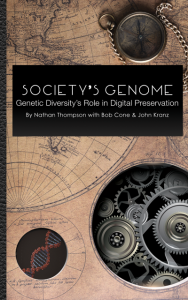Spectra Logic CEO Publishes Book ‘Society’s Genome: Genetic Diversity’s Role in Digital Preservation’
Story Highlights
Spectra Logic Chief Executive Officer Nathan C. Thompson, along with colleagues Bob Cone and John Kranz, has published a new book, “Society’s Genome: Genetic Diversity’s Role in Digital Preservation.”
 With nearly 40 years of experience as a data storage industry leader and CEO, Thompson draws on the lessons of history and nature in addressing civilization’s unquenchable thirst for information and our need to find genetically diverse methods to preserve this collective knowledge base – society’s genome – for future generations.
With nearly 40 years of experience as a data storage industry leader and CEO, Thompson draws on the lessons of history and nature in addressing civilization’s unquenchable thirst for information and our need to find genetically diverse methods to preserve this collective knowledge base – society’s genome – for future generations.
“Society’s Genome: Genetic Diversity’s Role in Digital Preservation” is a guide to understanding greater trends in information storage and data preservation. The book details how vital it is to store our information, and the astounding statistics around society’s digital data growth and utilization. The amount of data stored in the “digital universe” will reach 17 zettabytes, or 17,000,000,000,000,000,000,000 bytes, by 2025, largely driven by:
Scientific research – Zettabytes of long-term data are being created every year, which will ultimately be kept forever.
Genomics – The medical industry is expecting one billion people to have their genomes sequenced by 2025. Genomic sequencing will reach one zettabyte (1000 petabytes) of outputted data per year by 2025.
Video sharing – Six billion hours of YouTube videos are watched each month, with one billion of those hours accessed by mobile phones. Contractually these videos must be kept forever.
Social media – LinkedIn has more than 300 million users and adds two new members every second; and Facebook stores more than 250 petabytes of information and accrues another half petabyte every day.
Cloud – Public cloud revenue continues to grow exponentially, with some projections showing over 40 percent year over year.
Entertainment – Not only do we see continued growth in the output of movies, news, sports and regular programming, but the density of these programs is increasing as well. Moving from an HD format at 24 frames per second (fps) to 4K format at 60 fps requires roughly 30 times the storage. Most media and entertainment content is being stored forever.
“Society’s Genome: Genetic Diversity’s Role in Digital Preservation” speaks to the enormous amount of society’s knowledge now stored in the digital universe. Mediums of storage change; what started with punch cards has advanced to magnetic and semiconductor storage, and may ultimately evolve to phase change or DNA-based storage.
As we continue to evolve from paper to digital storage, society will grow increasingly dependent on the availability of its historical data. To date, exceptional digital preservation has led to tremendous advances in healthcare, predictive planting, infrastructure and connectivity, benefiting humanity’s overall quality of life. Society will continue to leverage its digital information to move itself forward — both tomorrow and for the next several hundred years.
Just as genomes are the genetics of all organisms, the digital universe is the “genetic basis” of society. Organizations can emulate nature’s proven successes to protect and preserve the digital universe through practices like multiple copy creation; incorporating “genetically diverse” platforms within the data center; geographic dispersal of physical hardware for disaster recovery; and conducting checksums to ensure error reduction.
“New technologies, devices, population growth and the spread of the digital revolution all support the idea of explosive, exponential data growth,” says Thompson. “We developed this work to inspire a larger conversation on the digital universe, its importance to society and our joint responsibility to enduringly preserve it.
PRICING AND AVAILABILITY
“Society’s Genome: Genetic Diversity’s Role in Digital Preservation” may be purchased on Amazon, Barnes & Noble, iTunes and numerous online bookstores. The Kindle and paperback versions are available for $7.99 and $16.95 respectively on Amazon here. The eBook is also available for download through Barnes and Noble and iTunes for $7.99.
